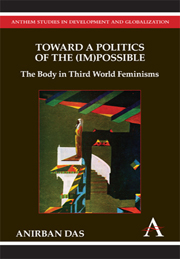Book contents
- Frontmatter
- Contents
- Acknowledgements
- Introduction
- 1 Body, Power and Ideology
- 2 Thinking the Body: Metaphoricity of the Corporeal
- 3 Thinking the Body: Negotiating the Other/Death
- 4 Thinking the Body: Beyond the Topos of Man
- 5 Violence and Responsibility: Embodied Feminisms
- In Conclusion: Toward a Politics of the (Im)Possible
- Notes
- Bibliography
- Index
- Frontmatter
- Contents
- Acknowledgements
- Introduction
- 1 Body, Power and Ideology
- 2 Thinking the Body: Metaphoricity of the Corporeal
- 3 Thinking the Body: Negotiating the Other/Death
- 4 Thinking the Body: Beyond the Topos of Man
- 5 Violence and Responsibility: Embodied Feminisms
- In Conclusion: Toward a Politics of the (Im)Possible
- Notes
- Bibliography
- Index
Summary
What shall I do with this absurdity –
…
I pace upon the battlements and stare
On the foundations…
“The Tower”, William Butler Yeats, 1926The Argument
Any form of Knowing has to negotiate the unanticipatable. By definition, the act of knowing has to know what is already not available to knowledge. To make known what already is known does not involve the process of knowing; it is the act of repeating the already-known.
There are two basic ways to approach the unanticipatable. One is to make it derivable from what is already-known. The other is to respect the fact that it is underivable from the present. As we will see later, these two ways may not be mutually exclusive.
To derive the unknown from the existing corpus of the known is not a homogeneous process. Some of the attempts that follow this process can also acknowledge that there are elements of indecision and uncertainty in the realm of the not-yet-known. This process tries to formulate a calculus of that uncertainty. Thus the range of indecision may be calculated. This calls for a new gloss on the notion of calculation.
To treat the unknown as underivable from the present is not to deny the necessity of calculating the ways of reaching out towards the unknown. This calculus always has incalculable remains. The decision to know the unknown in a specific way is the decision to leap across an ineffable gulf toward a remainder not amenable to the calculations of the commensurable.
- Type
- Chapter
- Information
- Toward a Politics of the (Im)PossibleThe Body in Third World Feminisms, pp. xiii - xxiiPublisher: Anthem PressPrint publication year: 2010



